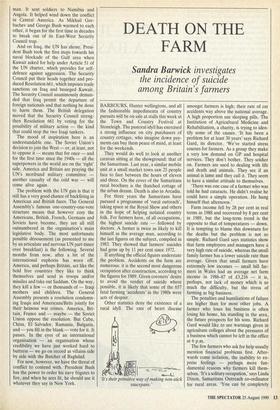DEATH ON THE FARM
Sandra Barwick investigates the incidence of suicide among Britain's farmers
BARBOURS, Hunter wellingtons, and all the fashionable impedimenta of country pursuits will be on sale at stalls this week at the Town and Country Festival at Stoneleigh. The pastoral idyll has exercised a strong influence on city purchasers of country cottages, who imagine down pay- ments can buy them peace of mind, at least for the weekends.
They would do well to look at another caravan sitting at the showground: that of the Samaritans. Last year, a similar mobile unit at a small market town saw 25 people face to face between the hours of eleven and three. On the cover of the Samaritans rural brochure is the thatched cottage of the urban dream. Death is also in Arcadia.
For three years the Samaritans have pursued a programme of 'rural outreach', taking space at the Royal Show and others in the hope of helping isolated country folk. For farmers have, of all occupations, the highest suicide rate — followed by doctors. A farmer is twice as likely to kill himself as the average man, according to the last figures on the subject, compiled in 1983. They showed that farmers' suicides had gone up by 11 per cent since 1972.
If anything the official figures understate the problem. Accidents on the farm are numerous: it is the second most dangerous occupation after construction, according to the figures for 1989. Given coroners' desire to avoid the verdict of suicide where possible, it is likely that some of the 657 fatal farming 'accidents' in the 1980s were acts of despair.
Other statistics deny the existence of a rural idyll. The rate of heart disease 'It's their primitive way of making non-stick saucepans.' amongst farmers is high; their rate of car accidents way above the national average.
A high proportion use sleeping pills. The Institution of Agricultural Medicine and Rehabilitation, a charity, is trying to iden- tify some of the causes. 'It has been a problem for at least 30 years' says Richard Gard, its director. 'We've started stress courses for farmers. As a group they make a very low demand on GP and hospital services. They don't bother. They soldier on. Farmers are used to dealing with life and death and animals. They see if an animal is lame and they cull it. They seem to have a similar attitude to themselves.
`There was one case of a farmer who was told he had cataracts. He didn't realise he could have a simple operation. He hung himself that afternoon.'
Farm income fell by 28 per cent in real terms in 1988 and recovered by 8 per cent in 1989, but the long-term trend is the opposite to that of temperatures — down. It is tempting to blame this downturn for the deaths but the problem is not so simple. Richard Gard says statistics show that farm employers and managers have a very high rate of suicide, whereas the small family farmer has a lower suicide rate than average. Given that small farmers have extremely low incomes — small hill far- mers in Wales had an average net farm income in 1986-87 of £3,216 — it is, perhaps, not lack of money which is so much the difficulty, but the stress of farming as big business.
The penalties and humiliations of failure are higher than for most other jobs. A farmer who loses his business is often losing his home, his standing in the area, the future prospects for his sons. Richard Gard would like to see warnings given in agriculture colleges about the pressures of a business which cannot be left in the office at 6 p.m.
The few farmers who ask for help usually mention financial problems first. After- wards come isolation, the inability to ex- press feelings — perhaps more fun- damental reasons why farmers kill them- selves. 'It's a solitary occupation,' says Linda Dixon, Samaritans Outreach co-ordinator for rural areas. 'You can be completely isolated, brooding on the knowledge that the farm could collapse if the next harvest fails. They can't imagine any other life but farming.'
Far fewer now work on the land, and a farmer may have good reason not to confide worries in those few, given the speed at which rural gossip flies. Jenny Cornelius started to specialise in stress counselling because she had been a nurse in Kent, and seen many farmers with what she thought were stress-related medical problems, from headaches through insom- nia and skin problems to strokes. 'They tend not to confide in their wives, to protect them, they bottle things up, and they find it hard to seek help. Once they open up, it can be relieved, looked at. One farmer I was talking to broke down in tears for the first time. He said it was a tremendous relief. "Aye, it's like clearing a blocked gutter," he said.'
The results of the next survey of suicides will not be available until 1992. With the steep rise in interest rates, and severe drops in the value of agricultural land, few in farming think that the suicide rate has gone down. But a large difficulty suffered by those attempting to alleviate this prob- lem of rural isolation is that there is very little sympathy from those outside farming.
Not only is the general public blinded by its vision of pastoral bliss, but the knowledge that farm subsidies are high and that some farmers do well distorts the truth that most farmers are having a far from easy ride.
This blindness exacerbates the farmers' problems. Despite repeated searches Richard Gard has failed to find a psychiat- rist who specialises in rural stress, though hundreds study urban strains.
The strains in the country are likely to increase. The agreement in Houston last month by President Bush, Mrs Thatcher the five other summit leaders that farm subsidies must be reduced has a long-term good in mind. In the short term, however. the Samaritans' caravans are likely to remain a feature of the countryside.











































 Previous page
Previous page